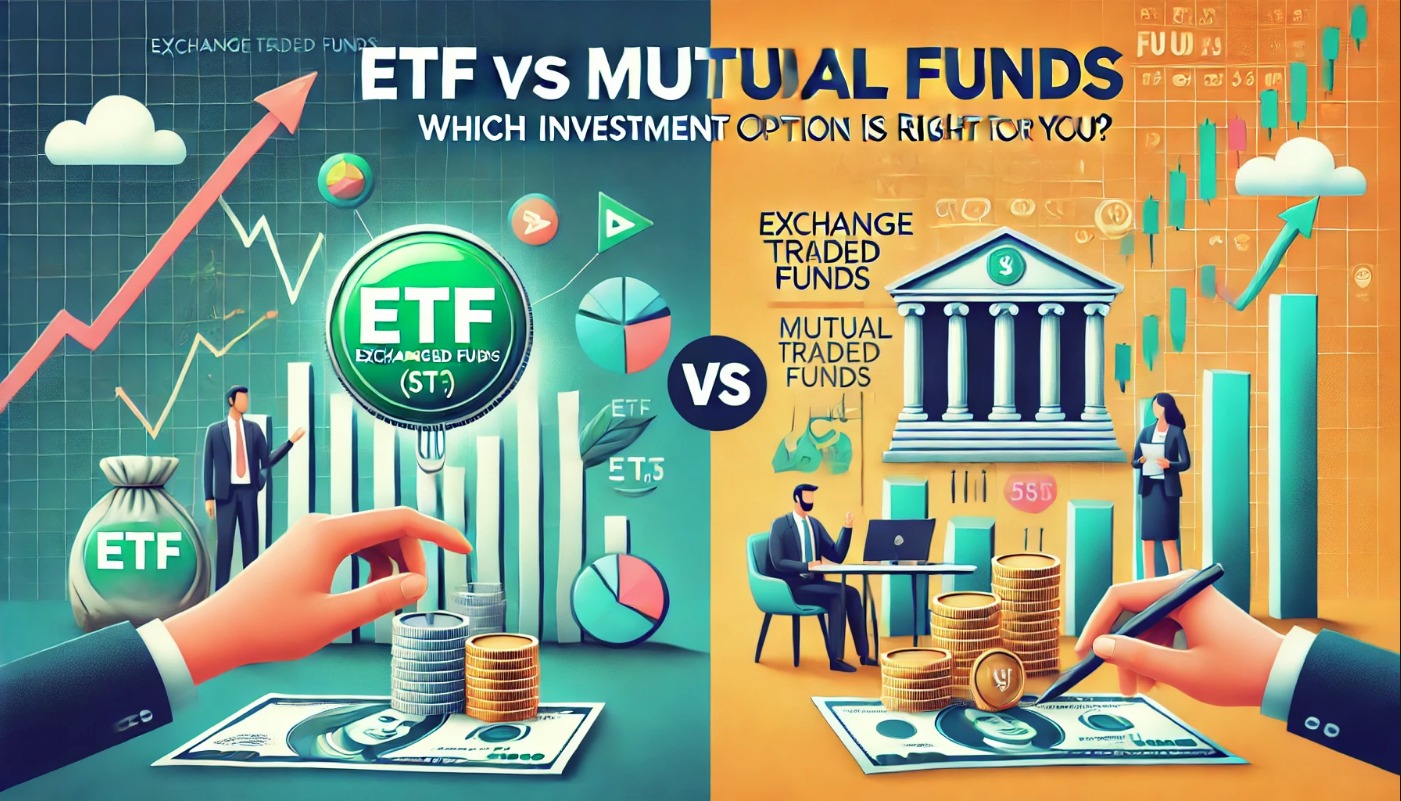ETF vs Mutual Funds: Which Investment Option is Right for You?

In the world of investing, two popular options that often come up in discussions are Exchange-Traded Funds (ETFs) and Mutual Funds. While both can provide a diversified portfolio, they operate quite differently and offer unique advantages and disadvantages. If you’re an investor looking to choose between these two, this guide will help you understand the key differences, the benefits of each, and how to determine which one aligns best with your financial goals.
What is an ETF?
An Exchange-Traded Fund (ETF) is a type of investment fund that holds a collection of assets, such as stocks, bonds, commodities, or a mix of these. Unlike mutual funds, which are bought or sold only at the end of the trading day, ETFs are traded on stock exchanges just like individual stocks. This means that you can buy or sell ETFs throughout the trading day at market prices that can fluctuate during market hours.
Key Features of ETFs
- Traded like stocks: ETFs can be bought and sold at any time during market hours, providing liquidity and flexibility.
- Low Expense Ratios: ETFs typically have lower expense ratios compared to mutual funds, making them a cost-effective option for long-term investors.
- Diversification: Just like mutual funds, ETFs offer diversification by pooling investments across a broad range of securities, helping to reduce risk.
- Transparency: Most ETFs disclose their holdings on a daily basis, allowing investors to see exactly what assets they are invested in.
What is a Mutual Fund?
A Mutual Fund is a pool of funds collected from various investors to invest in a diversified portfolio of stocks, bonds, or other securities. Mutual funds are managed by professional fund managers who make investment decisions on behalf of the fund’s investors. Mutual funds are bought or sold at the net asset value (NAV) price, which is determined at the end of each trading day.
Key Features of Mutual Funds
- Professional Management: Mutual funds are managed by experienced fund managers who make decisions on the fund’s behalf, making them a suitable option for investors who may not have the time or expertise to manage their own portfolio.
- No Intraday Trading: Unlike ETFs, mutual funds cannot be bought or sold during market hours. Transactions are executed at the NAV price at the end of the day.
- Higher Expense Ratios: Mutual funds generally have higher expense ratios due to active management and other fees, which can affect your long-term returns.
- Dividend Reinvestment: Mutual funds often offer automatic reinvestment of dividends, allowing investors to grow their holdings without needing to actively manage their portfolio.
ETF vs Mutual Funds: Key Differences
| Features | ETF’s | Mutual Funds |
| Trading | Traded on stock exchanges | Purchased or redeemed at NAV at end of the day |
| Fees | Lower expense ratios | Higher fees, especially for actively managed funds |
| Liquidity | High, traded throughout the day | Lower, only bought/sold at end of day |
| Management | Typically passively managed (though active ETFs exist) | Actively or passively managed |
| Investment Strategy | Passively tracks an index or sector | Active management or index tracking |
| Investment Minimum | No minimum, buy in shares | Minimum investment varies, typically higher |
| Transparency | Daily disclosure of holdings | Monthly or quarterly disclosures |
| Dividends | Paid periodically, reinvestment options available | Typically paid out or reinvested automatically |
Pros and Cons of Mutual Funds
Pros of Mutual Funds:
- Professional Management: Mutual funds provide access to professional portfolio management, which can be advantageous for investors who prefer not to manage their investments actively.
- Systematic Investment Plans (SIPs): Mutual funds often allow for systematic investment through SIPs, making it easier for investors to contribute small amounts regularly.
- Less Frequent Trading: Investors looking to take a more hands-off approach may appreciate that mutual funds are not subject to daily price fluctuations like ETFs.
Cons of Mutual Funds:
- Higher Fees: Actively managed mutual funds often come with higher management fees, which can eat into returns over time.
- Limited Flexibility: You can only buy or sell mutual funds at the end of the trading day, limiting the flexibility that ETFs provide.
- Capital Gains Taxes: Investors in mutual funds may face taxes on capital gains distributions, especially if the fund is actively managed.
Which is Better: ETF or Mutual Fund?
Choosing between an ETF and a mutual fund depends on your investment goals, time horizon, and preferences.
- Go for ETFs if:
- You prefer lower fees and costs.
- You want to trade throughout the day for greater flexibility.
- You’re comfortable with passive investment strategies.
- You have a long-term investment horizon and are looking to minimize taxes and fees.
- Go for Mutual Funds if:
- You prefer professional management and are willing to pay higher fees for active management.
- You want to invest through systematic plans like SIPs.
- You don’t mind the lack of intraday trading and prefer investing in a diversified portfolio managed by experts.
Conclusion
Both ETFs and Mutual Funds offer excellent options for diversifying your portfolio and achieving long-term investment goals. While ETFs are cost-effective, flexible, and tax-efficient, Mutual Funds provide professional management and automatic investment options. Understanding the strengths and weaknesses of each will help you make an informed decision based on your individual needs. Whether you are a seasoned investor or just starting, both options can be valuable tools for growing your wealth over time.
So, which will you choose: ETFs or Mutual Funds? The right choice comes down to your investment strategy, risk tolerance, and personal preferences. Either way, investing in either of these options can set you on the path to financial success.


